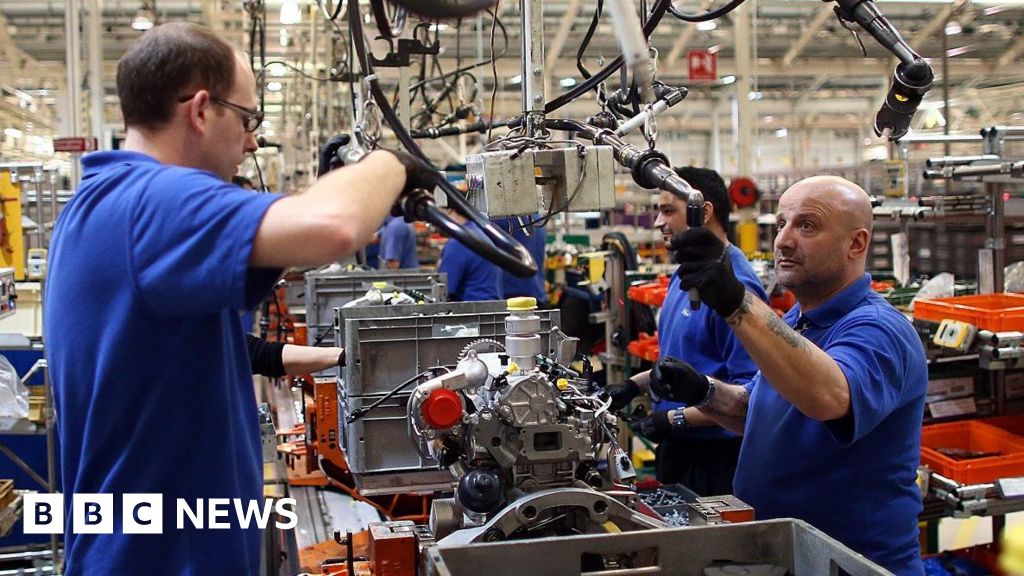Pledge to protect UK firms from cheap imports

The government has unveiled a plan for trade aimed at boosting exports and protecting UK firms at a time of growing uncertainty for businesses following the introduction of US tariffs.
It aims to remove obstacles for UK businesses selling abroad while also bolstering the country’s trade defences to avoid the risk of cheap imports undercutting domestic companies.
Some sectors are concerned that cars and steel originally destined for US markets will be diverted to UK shores, as President Donald Trump’s tariffs make it significantly more expensive to sell in America.
But Business Secretary Jonathan Reynolds said the UK’s plan would “ensure British businesses are protected from harm”.
A unilateral trade strategy could be difficult to achieve – it is a game of international give and take and the plan is more about sharpening offence and defence.
One offence strategy outlined is that there will be more government financial backing for exporters. UK Export Finance, the export credit agency, will get £20bn more capacity, up to £80bn from £60bn.
Exporters will also get more help understanding complex trade rules.
But the key part for many is the defensive strategy, in particular for industries such as steel and cars.
Current safeguards against cheap steel imports are due to expire in 2026, and the government has launched a call for evidence from steel producers to ask for their views.
Unlike the EU, the UK has not imposed high tariffs on Chinese-made electric vehicles and an influx of Chinese made cars would make it difficult for UK sellers to compete.
The trade plan comes after the government unveiled its 10-year industrial strategy, which included a blueprint of lowering energy costs for thousands of businesses by exempting them from some green energy taxes.
The trade strategy will be discussed at the annual British Chambers of Commerce (BCC) conference in London on Thursday, which is focused on how to boost economic growth.
Ministers hope that after raising employer National Insurance contributions (NICs), firms see this summer of strategies as proof that the government is on their side.
One of the main themes of the conference is a call for a halt to placing more taxes on business, with BCC research suggesting that a third of firms have either made staff redundant or are planning to due to the NICs increase.
At the conference, the government is announcing an increased focus on boosting the UK’s exports of services, and pointing to recent successes in signing a free trade agreement with India after years of wrangling.
It is also highlighting closer trading ties with the EU and being the first country to secure better terms with the White House on tariffs.
At the start of his second time as president, US President Donald Trump announced a series of import taxes on goods from other countries, claiming they will boost American manufacturing and protect jobs.
He has said that America has been taken advantage of by “cheaters” and “pillaged” by foreigners.
The US and UK agreed a deal on steel and car imports in May, and Trump signed an order reducing car tariffs in June.
Negotiations are continuing on steel, but the US has set a deadline of 9 July for trade agreements in general.
As part of the UK-US deal, the UK will remove a 19% tariff on US bioethanol imports.
However, this has led to warnings that the UK’s bioethanol industry is at risk of being wiped out.
Associated British Foods has threatened to close one of the UK’s two bioethanol plants if it does not receive state support.
Andrew Opie of the British Retail Consortium (BRC), which represents retailers, said that though the UK’s trade deals were good, the bigger win for consumers would be “swift action” by UK Chancellor Rachel Reeves on abuse of the “de minimis” rule, which allows low-value packages to enter the UK tax-free.
The rule is intended for consumers buying goods for personal use from abroad, but businesses have also used it, taking advantage of not paying tax on their goods.
Critics including the BRC say the rule gives overseas firms such as Shein and Temu an unfair advantage over British businesses.
“The limited checks and balances on such goods entering the country put consumers at risk from products that do not meet the UK’s high standards, and retailers at risk from competition by those who would sell such goods,” Mr Opie said.
The Liberal Democrats said the trade strategy “shows a government cowering in the corner”, afraid to upset Trump.
Lib Dem deputy leader Daisy Cooper said: “The most obvious defence is a deeper and closer relationship with our biggest and closest neighbour through a bespoke UK-EU customs union.”
The “would turbocharge the economy and bring in the billions needed to rebuild our public services and protect household budgets”, she added.
But Prime Minister Sir Keir Starmer said trade deals with the US, India and the European Union have “restored our identity” on the world stage and showed “that even in this volatile world, Britain is proudly, unashamedly, defiantly even open for business”.
However, Conservative shadow business secretary Andrew Griffith said: “It’s actions, not words, that count.
“We’re yet to see an India deal, Labour still haven’t published the EU deal, the Gulf deal is nowhere to be seen, and there is still no evidence they will take advantage of the Trans Pacific Partnership we secured.”




